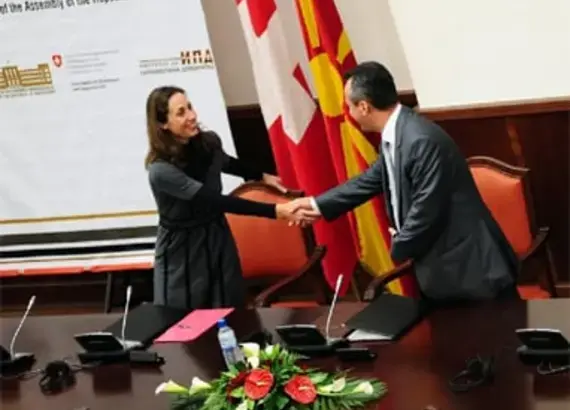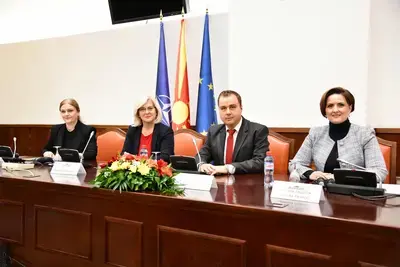
Success Story
In Macedonia, New Legislative Research Institute to Aid Lawmakers
Located at the center of historical conflicts in the Balkans, modern-day Macedonia has overcome many challenges since Yugoslavia disintegrated and the country of three million peacefully gained independence in 1991. Escalating tension between majority Macedonians and a sizable Albanian community led to open conflict in 2001 that was staunched by a peace agreement, known as the Ohrid Accords, which has provided stronger constitutional and political protections for ethnic Albanians.
Since then, Macedonia has become an official candidate for membership in both the European Union and NATO, and has made tremendous strides toward political stability through democratic governance. The country, like its neighbors, wrestles with the legacy of communist rule as it seeks to foster political participation, accountability and transparency. Central to this mission is the role of parliament—where government and citizens meet.
To help members of parliament (MPs) and committees make informed decisions in their legislative drafting, the parliament would like to have an impartial professional legislative research and analysis service, which it currently lacks. To address this situation, the parliament, with support from all political parties, is participating in a three-year project to create such a facility. The project is funded by the Swiss Agency for Development and Cooperation (SDC) and implemented by NDI and its Macedonian partner, the Institute for Parliamentary Democracy (IPD).
The research institute, which is slated to begin offering services in as soon as six months, will help MPs with much-needed background information to generate and amend legislation, oversee public expenditures and monitor implementation of laws.
Modeled after the Parliamentary Institutes in the Czech Republic and Slovakia, Macedonia’s institute will employ analysts and researchers, including lawyers, economists, trainers, historians, librarians and information technology specialists. It will have a modern research library and provide services in Macedonian and Albanian. The Institute will network with similar European libraries to harmonize statutes with existing laws in the European Union.
At the project’s May 17 inaugural event in the Macedonian capital, Skopje, Swiss Ambassador Nicole Wyrsch signed the agreement with the President of the National Assembly, Trajko Veljanovski. “Strengthening comprehensive parliamentary capacities is an important priority for the Assembly,” Veljanovski said. “Our assessment is that the introduction of this kind of research and analytical service to members of parliament will advance the lawmaking and oversight role of the Assembly of the Republic of Macedonia.”
Ambassador Wyrsch stressed the importance of the institute as a tool for the assembly. “One central objective of the project is to provide the assembly with an independent and highly competent source of research and analysis,” she said. “Indeed, the [institute] can be a very useful instrument – a real opportunity for Macedonia’s decision makers to move further ahead toward a full-fledged, transparent, well-functioning democracy.”
On June 21, Speaker Veljanovski and a high-level parliamentary delegation met with the SDC’s leadership in the Swiss capital of Bern for an official hand-over of the memorandum. The parliamentarians from Macedonia also met with the president of the Swiss Council of States, Erika Forster-Vannini; representatives of the Swiss Foreign Ministry; and members of parliament from the bicameral Swiss Federal Assembly to discuss legislative openness, multilingualism and parliamentary outreach to civil society organizations and the general public.



